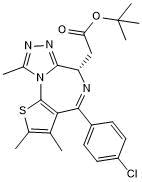(+)-JQ1
Chemical Name: (6S)-4-(4-Chlorophenyl)-2,3,9-trimethyl-6H-thieno[3,2-f][1,2,4]triazolo[4,3-a][1,4]diazepine-6-acetic acid 1,1-dimethylethyl ester
Purity: ≥98%
Biological Activity
(+)-JQ1 is a potent, high affinity, selective BET bromodomain inhibitor (IC 50 values are 17.7, 32.6, 76.9 and 12942 nM for BRD2 (N-terminal (N)), BRD4 (C-terminal (C)), BRD4 (N) and CREBBP respectively; K d values are 49, 59.5, 82, 90.1, 128 and 190 nM for BRD4 (N), BRD3 (N), BRD3 (C), BRD4 (C), BRD2 (N) and BRDT (N) respectively). (+)-JQ1 induces squamous differentiation in NUT midline carcinoma (NMC) cell lines and inhibits tumor growth in NMC xenograft models in vivo. (+)-JQ1 inhibits proliferation and induces autophagy in bladder cancer cells in vitro and in vivo. It also suppresses MYC gene expression and inhibits proliferation of lymphoma and leukemia cell lines. In human pulmonary microvasular endothelial cells (HPMEC), NF-κB activation, IL-6 and IL-8 expression and proliferation are inhibited by (+)-JQ1. The compound also inhibits transcription of ACE2 and TMPRSS2 genes in mouse lung tissue and prevents infection by SARS-CoV-2. In germ cells from male mice, (+)-JQ1 exhibits reversible contraceptive effects. (+)-JQ1 inhibits the BRD4-JUN-CCL2-TNF-α axis in pancreatic cancer cells and improves survival by reducing macrophage recruitment. Inactive Analog also available. Carboxylic acid-functionalized (Cat. No. 6588) and click-activated (alkyne) (Cat. No. 6589) versions for PROTAC development also available.External Portal Information
Chemicalprobes.org is a portal that offers independent guidance on the selection and/or application of small molecules for research. The use of (+)-JQ1 is reviewed on the chemical probes website.Technical Data
The technical data provided above is for guidance only.
For batch specific data refer to the Certificate of Analysis.
Tocris products are intended for laboratory research use only, unless stated otherwise.
Additional Information
Background References
-
Targeting MYC dependence in cancer by inhibiting BET bromodomains.
Mertz JA, Conery AR, Bryant BM et al.
Proc Natl Acad Sci U S A -
Selective inhibition of BET bromodomains.
Filippakopoulos et al.
Nature, 2010;468:1067 -
Small-molecule inhibition of BRD4 as a new potent approach to eliminate leukemic stem- and progenitor cells in acute myeloid leukemia AML.
Herrmann et al.
Oncotarget. [Epub ahead of print], 2012;3:1588 -
Small-molecule inhibition of BRDT for male contraception.
Matzuk et al.
Cell, 2012;150:673
Product Datasheets
Reconstitution Calculator
Molarity Calculator
Citations for (+)-JQ1
The citations listed below are publications that use Tocris products. Selected citations for (+)-JQ1 include:
23 Citations: Showing 1 - 10
-
Pharmacologic Targeting of TFIIH Suppresses KRAS-Mutant Pancreatic Ductal Adenocarcinoma and Synergizes with TRAIL.
Authors: Christopher J Et al.
Cancer Res 2022;82:3375-3393
-
BET and CDK Inhibition Reveal Differences in the Proliferation Control of Sympathetic Ganglion Neuroblasts and Adrenal Chromaffin Cells.
Authors: Uwe Et al.
Cancers (Basel) 2022;14
-
BRD9 regulates interferon-stimulated genes during macrophage activation via cooperation with BET protein BRD4.
Authors: Nasun Et al.
Proc Natl Acad Sci U S A 2022;119
-
TNF stimulation primarily modulates transcriptional burst size of NF-κB-regulated genes.
Authors: Suzanne Et al.
Mol Syst Biol 2021;17:e10127
-
Transcriptional super-enhancers control cancer stemness and metastasis genes in squamous cell carcinoma.
Authors: Yang Et al.
Nat Commun 2021;12:3974
-
Resistance to BET inhibitors in lung adenocarcinoma is mediated by casein kinase phosphorylation of BRD4.
Authors: Daniel Et al.
Oncogenesis 2021;10:27
-
BET-Inhibitor I-BET762 and PARP-Inhibitor Talazoparib Synergy in Small Cell Lung Cancer Cells.
Authors: Francesco Paolo Et al.
Int J Mol Sci 2020;21
-
BET protein targeting suppresses the PD-1/PD-L1 pathway in triple-negative breast cancer and elicits anti-tumor immune response.
Authors: Andrieu Et al.
Cancer Lett 2019;465:45
-
Activity of BET-proteolysis targeting chimeric (PROTAC) compounds in triple negative breast cancer.
Authors: Noblejas-Lopez Et al.
J Exp Clin Cancer Res 2019;38:383
-
Super-Enhancer-Associated LncRNA UCA1 Interacts Directly with AMOT to Activate YAP Target Genes in Epithelial Ovarian Cancer.
Authors: Lin Et al.
iScience 2019;17:242
-
Bromodomain protein BRD4 inhibitor JQ1 regulates potential prognostic molecules in advanced renal cell carcinoma.
Authors: Sakaguchi
Oncotarget 2018;9(33):23003
-
PTBP1-Mediated Alternative Splicing Regulates the Inflammatory Secretome and the Pro-tumorigenic Effects of Senescent Cells.
Authors: Georgilis Et al.
Cancer Cell 2018;34:85
-
Targeting the HTLV-I-Regulated BATF3/IRF4 Transcriptional Network in Adult T Cell Leukemia/Lymphoma.
Authors: Michiyuki Et al.
Cancer Cell 2018;34:286-297.e10
-
IRE1α RNase-dependent lipid homeostasis promotes survival in Myc-transformed cancers.
Authors: Xie Et al.
J Clin Invest 2018;128:1300
-
VEGF amplifies transcription through ETS1 acetylation to enable angiogenesis.
Authors: Chen
Nat Commun 2017;8(1):383
-
The Short Isoform of BRD4 Promotes HIV-1 Latency by Engaging Repressive SWI/SNF Chromatin-Remodeling Complexes.
Authors: Qiang Et al.
Mol Cell 2017;67:1001-1012.e6
-
Bromodomain Protein BRD4 Is a Transcriptional Repressor of Autophagy and Lysosomal Function.
Authors: Scott W Et al.
Mol Cell 2017;66:517-532.e9
-
AMPK-ULK1-Mediated Autophagy Confers Resistance to BET Inhibitor JQ1 in Acute Myeloid Leukemia Stem Cells.
Authors: Jang Et al.
Clin Cancer Res 2017;23:2781
-
MYCL is a target of a BET bromodomain inhibitor, JQ1, on growth suppression efficacy in small cell lung cancer cells.
Authors: Kato Et al.
Oncotarget 2016;7:77378
-
Reprogramming by De-bookmarking the Somatic Transcriptional Program through Targeting of BET Bromodomains.
Authors: Shao Et al.
Cell Rep 2016;16:3138
-
Epigenetic Readers of Lysine Acetylation Regulate Cocaine-Induced Plasticity.
Authors: Sartor Et al.
J Neurosci 2015;35:15062
-
BET bromodomains regulate transforming growth factor-β-induced proliferation and cytokine release in asthmatic airway smooth muscle.
Authors: Perry Et al.
Nat Commun 2015;290:9111
-
Inhibition of BET proteins impairs estrogen-mediated growth and transcription in breast cancers by pausing RNA polymerase advancement.
Authors: Robert Et al.
Breast Cancer Res Treat 2015;150:265-78
FAQs
No product specific FAQs exist for this product, however you may
View all Small Molecule FAQsReviews for (+)-JQ1
There are currently no reviews for this product. Be the first to review (+)-JQ1 and earn rewards!
Have you used (+)-JQ1?
Submit a review and receive an Amazon gift card.
$25/€18/£15/$25CAN/¥75 Yuan/¥2500 Yen for a review with an image
$10/€7/£6/$10 CAD/¥70 Yuan/¥1110 Yen for a review without an image

